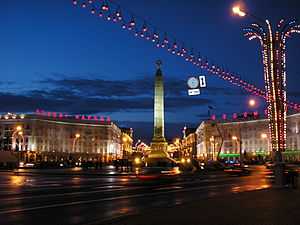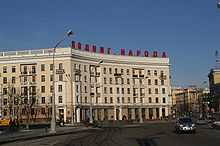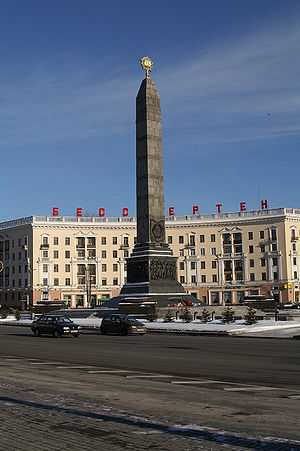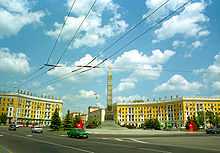Victory Square, Minsk
Coordinates: 53°54′30″N 27°34′28″E / 53.90833°N 27.57444°E

Victory Circus (Belarusian: Пло́шча Перамо́гі, Russian: Пло́щадь Побе́ды) — circus in the centre of the City of Minsk located at the crossing of Independence Avenue and Zakharau Street. The circus is located in the historic centre of Minsk nearby with the museum of the 1st Congress of RSDRP, Main offices of National State TV and Radio and City House of Marriages. A green park stretches from the Victory Circus to the river of Svislach and to the entrance to the M. Gorky Park. Victory Circus is the key landmark of Minsk. Holiday parades go through the circus. The newly married traditionally take their picture at the circus. Victory Circus is the Belarusian version of Red Square in Moscow in The Russian Federation.
Transportation: Metro Ploshcha Peramogi, street car 1,3,4,6,8,10,11
Victory Monument
A 3-meter replica of the Order of Victory crowns a granite column of 38 metre erected in the centre of the circus. The Sacred Sword of Victory is at the base of the monument. The monument was built in 1954 in honour of the soldiers of the Soviet Army and partisans of Belarus. Sculptors: Z. Azgur, A. Bembel, S. Selikhanau. Architects: U. Karol, G. Zagorski.
The four facets of the pedestal hold bronze relief thematic images: "May 9, 1945", "Soviet Army during the Great Patriotic War", "Belarusian Partisans", "Honour to Heroes who gave their lives for liberation".
The four bronze wreaths around the obelisk signify the four Fronts. The soldiers of these fronts gave their lives fighting to liberate Belarus from German Fascist invaders.
History of Construction

Prior to 1958 the circus held a name "Kruglaya" (Round). Builders led by architect R. Stoler started constructing two round buildings around the circus. During the Great Patriotic War the buildings were partially destroyed. R. Stoler returned to Minsk in 1957 to help rebuild these buildings. Before the Great Patriotic War a street car was running on Sovetskaya street through the circus. Before the construction of the Victory Monument there was a memorial stone fenced with a chain.

In 1946 the BSSR government opened a competition for design of a Victory Memorial. Initially the site was planned in the vicinity of the current "Kastrychnitskaya" (October) circus. Selected design provided for a 48-metre monument made of white pink marble. To open the memorial by the 10th anniversary of liberation of Belarus, the design was adjusted to use gray granite and make the column 10 metres shorter.
Ukrainian quarries near Dnepropetrovsk and Zhytomyr provided the granite for construction. Leningrad Academy of Arts crafted the mosaic for the Order of Victory. Ukrainian carvers indented the granite reliefs. Leningrad factory "Monumentskulptura" cast bronze reliefs, sward and wreaths.
3 July 1961,on the 17th anniversary of liberation of Minsk, Honourable Citizen of Minsk, Hero of Soviet Union colonel-general Alexei Burdeinei lit the Eternal Flame at the foundation of the obelisk.
In 1984 architects B. Larchenko, B. Shkolnikov, K.Vyazgin re-designed the circus from round into oval to fit the exits from metro station. On 1 July 1984 granite blocks were mounted with capsules containing soil from Soviet Hero Cities: Moscow, Saint Petersburg, Volgograd, Kiev, Odessa, Sevastopol, Kerch, Novorossiysk, Tula, Brest Fortress. In 1985 capsules with soil from Hero Cities Smolensk and Murmansk were added.

8 May 1985 in commemoration of 40th anniversary of Victory in Great Patriotic War a Memorial Hall opened in the pedestrian underpass under the Victory Circus. The Hall honours the Heroes of Soviet Union who gave their lives to liberate Belarus from Nazi occupation. A circular gallery under the circus connects the underpass with the Memorial Hall. Artist V. Pozhyak crafted a highlighted glass wreath in the center of the Hall. A bronze star of Hero of Soviet Union is embedded in the hall's wall. 566 names of natives from Belarus and other Soviet republics are listed on the wall. Those are the people who fought to liberate Belarusian soil and were awarded the title of Hero of Soviet Union for their heroic deeds.

In 2003 the circus was slightly updated to improve the monument stability due to damage from metro trains running under it, as well as to replace the grown-up firs with grass lawns.
External links
![]() Media related to Victory circus, Minsk at Wikimedia Commons
Media related to Victory circus, Minsk at Wikimedia Commons